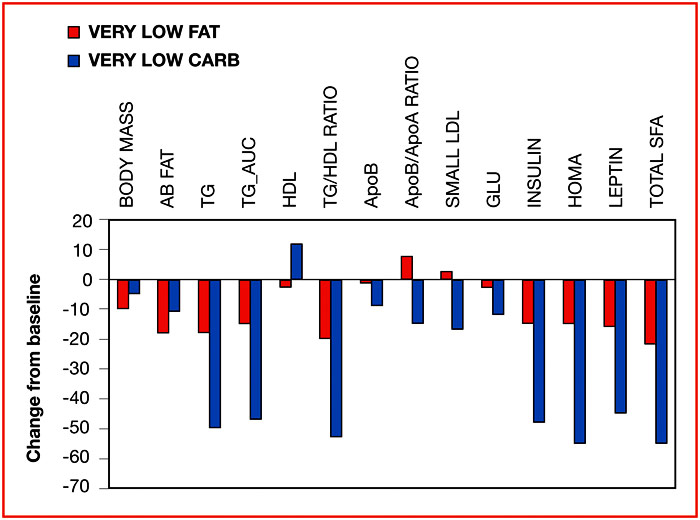Carbohydrates Kill Appetite Cells

Dietary Guidelines for Americans 2010 is the most recent report released by the USDA and HHS. This report recommends consuming carbohydrates at 45-65% of total daily calories. This guideline is compounding an already existing CARBOHYDRATE CRISIS.
What is the Carbohydrate Crisis?
We have an epidemic of obesity, diabetes, fatty liver, multiple sclerosis, arthritis, cardiovascular, Alzheimer’s, depressive disorders, schizophrenia, even autism and ADHD. If you or your loved ones have any of these diseases, the most likely cause is CARBOHYDRATES & SUGAR.
Are Carbohydrates a Driver of Health Issues in Modern Societies?
Yes! Western societies have 24 X 7 access to food that is dominated by carbohydrates. A carbohydrate, beyond its role as a source of energy, has an important regulatory function in the body. Dietary carbohydrates are the direct source of glucose or fructose, both of which serve as stimuli and regulators of many activities. It also stimulates insulin secretion, and/or affects the availability of other energy sources, such as free fatty acids, ketone bodies and glycogen.
INSULIN:
Insulin affects the expression of more than 150 genes. Chronic amplification of insulin signaling caused by carbohydrates, have diverse effects, such as Glycogenolysis (Glycogen breakdown), Gluconeogenesis (Glucose synthesis) Lipolysis, (Lipid breakdown), glycogen storage and protein synthesis & breakdown.
FRUCTOSE:
Increasing intake of fructose (estimated at 85–100 g/day) also exposes the liver. Dietary fructose by-passes two regulatory controls in the carbohydrate metabolic cycle. Fructose ingestion is thus associated with a general disruption in energy metabolism and acutely enhances after a food increase in blood fat concentration (postprandial lipemia) 1 and metabolic syndrome. 2
KETONE BODIES:
Ketone bodies are energy bodies produced by liver cells (hepatocytes) that metabolize fatty acid either during fasting, or upon consuming a fat dominant diet (ketogenic diet). The production of ketone bodies is very sensitive to carbohydrates. Fat metabolism during fasting is due to the absence of carbohydrates as opposed to a general elimination of calories 3. Ketogenic (high fat) diets increase the activation of genes that express enzymes responsible for lipid oxidation and decreases the expression of genes in fat production (lipogenes) 4. Ketogenic diets were recently shown to induce hepatic expression and increase circulating levels of a hormone (fibroblast growth factor 21 (FGF21) 5) . This coordinates lipid oxidation, ketogenesis, white adipose tissue fat breakdown (lipolysis), and triglyceride (a form of fat) clearance. Ketone bodies are an important part of energy consumption by brain cells. Carbohydrates reduce the production of ketone bodies.
GLYCOGEN:
Historically, Glycogen has been viewed solely as an energy source, especially for work out (contracting skeletal muscle) type activities. Recent work however, has linked glycogen metabolism with a range of metabolic processes 6 including the transport of glucose into cells. Several experimental models have shown that muscle glycogen levels exert an important influence on insulin-mediated and muscle (contraction) mediated glucose uptake, as well as un-stimulated (basal) glucose entry into cells. Glucose use (uptake) is higher in glycogen-depleted muscle 7 and there is an inverse relation between glycogen and glucose uptake across a broad range of glycogen levels 8. Prevention of glycogen synthesis, by fasting or feeding a low-carbohydrate/high-fat diets, result in insulin-mediated glucose transport 9. This means low glycogen (low carbohydrate) promotes increased insulin action while high glycogen promotes insulin resistance.
Does Carbohydrate Restriction Help?
Yes! Instead of fat restriction, even a short-term reduction in carbohydrates effects control of gene expression. Switching from a carbohydrate intake of 49% to 34% of energy for 3 days differentially regulates 369 genes in skeletal muscle in a manner consistent with a shift from glucose to fatty acid (oxidation) utilization 11. Experiments comparing low-fat and low-carbohydrate diets show in all 15 studies, a better lipid profile and greater increases in HDL-C on using low-carbohydrate diets as compared to low-fat diets (average absolute difference 11%) 12.

Do Carbohydrates Kill Appetite-Suppressing Cells? 13
Our appetite-suppressing cells are attacked by free radicals after eating. This degeneration is more significant following meals rich in carbohydrates and sugars. The more carbohydrates and sugars eaten, the more your appetite-control cells are damaged and you potentially consume more – according to the research report. A diet rich in carbohydrates and sugar has become more and more prevalent in modern societies over the last 20-30 years. This trend has placed so much strain on our bodies that it's leading to premature appetite cell deterioration.
What Is The Conclusion?
Carbohydrate restriction, even in the presence of highly saturated fatty acids, decreases the availability restriction, even in the presence of highly saturated fatty acids, decreases the availability of ligands (glucose, fructose, glycogen, and insulin) that activate lipogenics and inhibit fatty acid oxidative pathways. Carbohydrate restriction promotes fat burning instead of fat deposition.
The exact reasons are unclear, but the end result is increased fat oxidation, decreased lipogenesis (fat synthesis) and decreased secretion of very low-density lipoprotein (VLDL). These are all highly reliable indicators that carbohydrates are a key driver of metabolic disorder. Dietary carbohydrates perturb upstream response elements that result in a dysfunctional metabolic state.
High carbohydrate diets driving energy dysfunction is grounded in fundamental metabolic and evolutionary principles. As opposed to fat restriction, carbohydrate restriction is an evolutionarily preferred dietary strategy for managing good health.
Major energy management processes (production, consumption, conversion, storage) in cells, such as oxidative phosphorylation, gluconeogenesis, glycolysis, glycogenesis, glycogenolysis, fatty acid biosynthesis, fatty acid oxidation, ketogenesis, protein synthesis, amino acid cycles, PPP, TCA cycle and urea cycle BAA cycle, etc. are all self regulatory and are in equilibrium. Over loading of carbohydrates creates energy dysfunction and/or oxidative stress. Studies of these processes in patients with different diseases (Metabolomic studies) implicate dysfunctions in energy metabolism and subclinical inflammation in multiple diseases, such as Alzheimer’s, diabetes, obesity, retinopathy, schizophrenia, MDD, Bipolar disorder, IBD and cancers.
- Chong MF, et al, Am J Clin Nutr 2007;85:1511–20.
- Rutledge AC, et al Nutr Rev 2007;65:S13–23.
- S Klein, Am J Physiol 1992;262:E631–6.
- AR Kennedy. Am J Physiol Endocrinol Metab 2007;292:E1724–39.
- MK Bradmann, Cell Metab 2007;5:426–37.
- Hargreaves M. Proc Nutr Soc 2004;63:217–20.
- Hespel Richter et al, J Physiol, 1990;427:347–59.
- Derave W, Lund S, Am J Physiol 1999;277:E1103–10
- Garcia-Roves PM, Am J Physiol Endocrinol Metab 2003;285:E729–36.,
- Kawanaka K, Am J Physiol , Endocrinol Metab 2000;279:E1311–8.
- Sparks LM, et al. Metabolism 2006; 55:1457–63.
- Volek JS, et al J Nutr 2005;135:1339–42.
- Andrews, Z.B. et al. Nature, Vol. 454, p. 7204,
Disclaimer
Before starting any diet, you should speak to your doctor. You must not rely on the information on this website as an alternative to medical advice from your doctor or other professional healthcare provider. If you have any specific questions about any medical matter, you should consult your doctor or other professional healthcare provider. If you think you may be suffering from any medical condition, you should seek immediate medical attention. You should never delay seeking medical advice, disregard medical advice or discontinue medical treatment because of information on this website.









